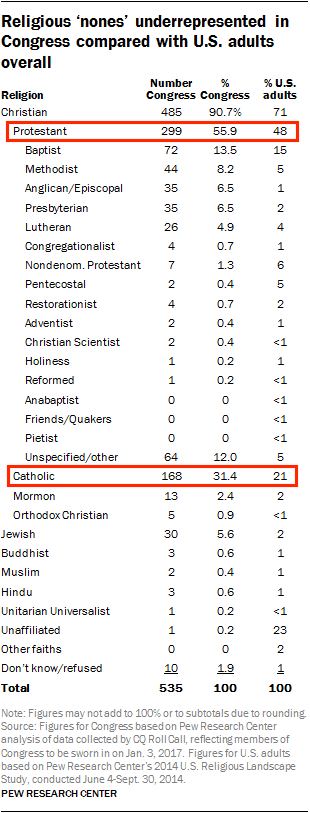I’ve seen some chatter about the underrepresentation of religiously unaffiliated Americans in Congress, but I want to phrase the issue a slightly different way—both Protestants and, especially, Catholics are overrepresented in the House and the Senate.

As you can see, while 48% of the U.S. population is Protestant, 55.9% of the U.S. Congress is Protestant. Similarly, 21% of the U.S. population is Catholic while 31.4% of the U.S. Congress is Catholic. Those are some pretty serious differences! Why does this matter? It’s true that there’s no requirement that Congress reflect the demographics of the American people. If there were, Congress would be far more female and African American than it currently is.
The problem is that if an issue, like, say, abortion were to come up on the Congress floor, one in three of the Senators and Representatives addressing the issue would belong to the Catholic Church, which expressly forbids abortion, in contrast to only one in five Americans. Similarly, if the issue at hand had to do with religious freedom, a Congress with only one religiously unaffiliated member would be far less likely to remember the interests of the 23% of Americans who are religiously unaffiliated than would a Congress where such Americans made up 23% of the congressional body.
Check this out, I made a graph:

It’s worth nothing that Congress is 91.5% Christian while the nation as a whole is a far lower 71% Christian. The problem with this should be obvious—such a Congress is far less likely to consider the needs and interests of religious minorities than it might otherwise be.
I’m not saying that members of Congress and incapable of considering and acting on the interests of all of their constituents. Clearly, they are capable of doing so—though taking the time to research and understand every segment of their constituency would of necessity take a serious investment of time and effort. I’m simply noting that it’s human nature to be more in tune with the needs and interests of one’s group—be that race, religion, or gender—and that getting outside of that is prohibitive.
Remember this all-male panel at a hearing on contraception?

Many women were justifiably upset when pictures of this panel began circulating, because they didn’t trust a panel made up solely of men to adequately understand and represent their needs and interests when it came to contraception. The same is true when it comes to other issues, including issues that affect religious minorities.
The problem isn’t simply that the religious unaffiliated are underrepresented in Congress, but also that Protestants and Catholics are overrepresented. It’s not just that secular voices are not present in a representative way, but also that the influence and voice of Christian Americans is amplified far beyond what it would be if Congress was an accurate demographic reflection of the American people.
And frankly, that makes evangelicals’ claims that Christians are being persecuted in the U.S. look downright strange.
I have a Patreon! Please support my writing!















